|
|
|
Sort Order |
|
|
|
Items / Page
|
|
|
|
|
|
|
| Srl | Item |
| 1 |
ID:
046232
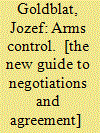

|
|
|
|
|
| Edition |
2nd ed.
|
| Publication |
London, Sage Publications, 2002.
|
| Description |
xliii, 396p.
|
| Standard Number |
0761940162
|
|
|
|
|
|
|
|
|
|
|
|
Copies: C:1/I:0,R:0,Q:0
Circulation
| Accession# | Call# | Current Location | Status | Policy | Location |
| 046011 | 327.174/GOL 046011 | Main | On Shelf | General | |
|
|
|
|
| 2 |
ID:
002732
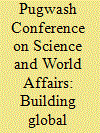

|
|
|
|
|
| Publication |
Cambridge, Pugwash Conference on Science and World Affairs, 1989.
|
| Description |
x, 518p.
|
|
|
|
|
|
|
|
|
|
|
|
Copies: C:1/I:0,R:0,Q:0
Circulation
| Accession# | Call# | Current Location | Status | Policy | Location |
| 034193 | 355.03/PUG 034193 | Main | On Shelf | General | |
|
|
|
|
| 3 |
ID:
143912


|
|
|
|
|
| Summary/Abstract |
This article deconstructs United Nations Security Council (UNSC) Resolution 2094 through the preambulatory statements, objectives, obligations, and implementation and enforcement provisions of UNSC Resolution 2094. The article proceeds in three parts. First, it reviews the academic literature on UNSC sanctions and their application in the North Korean case. Second, it deconstructs UNSC Resolution 2094 according to the common structural components of international legal instruments to assess the level of congruence between the objectives of UNSC Resolution 2094, its enforcement mechanisms and outcomes. Third, it explores the weaknesses of UNSC Resolution 2094, focusing on the gap between the objectives and enforcement mechanisms found in the resolution. The inability of the UNSC sanctions regime to prevent North Korea reaching the cusp of becoming a nuclear weapons power is evidence of the international community's weak leverage over Pyongyang, a situation arising from the vulnerability of South Korea to a North Korean attack and the cross-cutting strategic priorities of China; the absence of economic linkages between the Democratic People's Republic of Korea and the primary sanctions-sender state in the USA; and North Korea's commitment to a nuclear weapons capability as the foundation of its medium-term economic development strategy, its institutional governance structure and associated ideological commitments.
|
|
|
|
|
|
|
|
|
|
|
|
|
|
|
|
| 4 |
ID:
087450
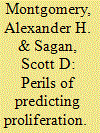

|
|
|
|
|
| Publication |
2009.
|
| Summary/Abstract |
Studies of nuclear proliferation share five serious problems. First, nuclear programs' initiation and completion dates are ambiguous and difficult to code, but findings are rarely subjected to sufficient robustness tests using alternative codings. Second, independent variables overlook important factors such as prestige and bureaucratic power and often use poor proxies for concepts such as the nonproliferation regime. Third, methodologies and data sets should be tightly coupled to empirical questions but are instead often chosen for convenience. Fourth, some findings provide insights already known or believed to be true. Fifth, findings can ignore or gloss over data crucial for policy making and wider debates. This article reviews new quantitative research on nuclear proliferation, noting improved analysis and lingering problems. It highlights the 1999 Kargil war to explore dangers of relying on stock data sets and the need for research on statistical outliers. It concludes with a future research agenda aimed at correcting problems and a cautionary note regarding hasty application of quantitative results to policy making.
|
|
|
|
|
|
|
|
|
|
|
|
|
|
|
|
| 5 |
ID:
098120


|
|
|
|
|
| Publication |
2010.
|
| Summary/Abstract |
The author examines the tenets of official PRC doctrine regarding the issues of nuclear weapons proliferation. An attempt is made to analyze contemporary China's understanding of the heart of this issue in the context of ensuring national geostrategic interests. The precepts of PRC foreign policy with respect to the role and place of nuclear non-proliferation and nuclear deterrence in the system of international security are described. China's political steps in regard to the nuclear issue on the Korean Peninsula are analyzed to examine the question of the practical application of its doctrinal tenets.
|
|
|
|
|
|
|
|
|
|
|
|
|
|
|
|
| 6 |
ID:
104078
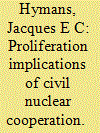

|
|
|
|
|
| Publication |
2011.
|
| Summary/Abstract |
Programs of international civil nuclear cooperation-of "Atoms for Peace"-have come under growing criticism for unintentionally fostering nuclear weapons proliferation in developing countries. However, drawing on the literature on international technology transfer and on Albert Hirschman's theory of exit, voice, and loyalty, this article argues that Atoms for Peace efforts may often seriously hamper developing countries' nuclear weapons ambitions by empowering their scientific workers and by facilitating the brain drain to the developed world. The article then presents a case study of the historical nuclear program of Yugoslavia, which received very generous help from the Atoms for Peace programs of the United States, Soviet Union, and European states at a time when nonproliferation controls were minimal. The international ties of the Yugoslav nuclear program made its scientific workers much less likely to choose simple loyalty to the Tito regime, and much more likely to choose voice or exit, accelerating the program's ultimate collapse.
|
|
|
|
|
|
|
|
|
|
|
|
|
|
|
|
| 7 |
ID:
033576
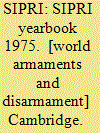

|
|
|
|
|
| Publication |
London, MIT Press, 1975.
|
| Description |
xx, 618p.hbk
|
| Series |
SIPRI Yearbook 1975
|
| Standard Number |
0262191407
|
|
|
|
|
|
|
|
|
|
|
|
Copies: C:1/I:0,R:0,Q:0
Circulation
| Accession# | Call# | Current Location | Status | Policy | Location |
| 014861 | 327.17405/SIP 014861 | Main | On Shelf | General | |
|
|
|
|
| 8 |
ID:
003039
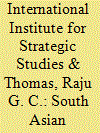

|
|
|
|
|
| Publication |
London, IISS/Brassey's, 1993.
|
| Description |
86p.
|
| Series |
Adelphi Paper; 278
|
| Standard Number |
1857530934
|
|
|
|
|
|
|
|
|
|
|
|
Copies: C:1/I:0,R:0,Q:0
Circulation
| Accession# | Call# | Current Location | Status | Policy | Location |
| 034537 | 327.5/INT 034537 | Main | On Shelf | General | |
|
|
|
|
| 9 |
ID:
087445


|
|
|
|
|
| Publication |
2009.
|
| Summary/Abstract |
When and why do states transfer nuclear technology, materials, and knowledge to other states for peaceful purposes? This question is important given the recent finding that countries receiving nuclear aid are more likely to pursue and acquire nuclear weapons. I argue that countries provide civil nuclear assistance for three strategic reasons: to strengthen their allies and alliances, to strengthen their relationship with enemies of enemies, and to strengthen existing democracies and bilateral relationships with these countries (if the supplier is also a democracy). I test these arguments using statistical analysis and a new data set on more than 2,000 bilateral civilian nuclear cooperation agreements signed between 1950 and 2000. The findings offer robust empirical support for my argument and very little support for the competing explanation rooted in norms and nonproliferation. This article enhances scholarly understanding of how and why nuclear weapons spread and encourages further research on the supply side of nuclear proliferation. It also has broad implications for the literatures on norms and international cooperation.
|
|
|
|
|
|
|
|
|
|
|
|
|
|
|
|
| 10 |
ID:
003073


|
|
|
|
|
| Publication |
1992.
|
| Description |
75p.
|
|
|
|
|
|
|
|
|
|
|
|
Copies: C:1/I:0,R:0,Q:0
Circulation
| Accession# | Call# | Current Location | Status | Policy | Location |
| 034077 | 355.825119/JAS 034077 | Main | On Shelf | General | |
|
|
|
|
| 11 |
ID:
030822
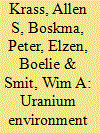

|
|
|
|
|
| Publication |
London, Taylor & Francis, 1983.
|
| Description |
xviii, 296p.
|
| Standard Number |
0850662192
|
|
|
|
|
|
|
|
|
|
|
|
Copies: C:1/I:0,R:0,Q:0
Circulation
| Accession# | Call# | Current Location | Status | Policy | Location |
| 021692 | 355.825119/KRA 021692 | Main | On Shelf | General | |
|
|
|
|
|
|
|
|
|